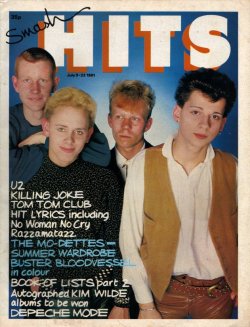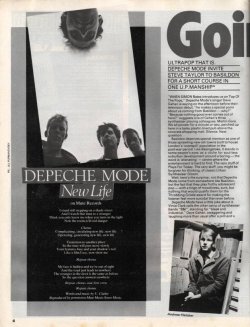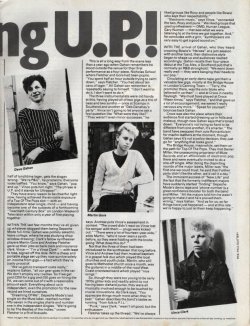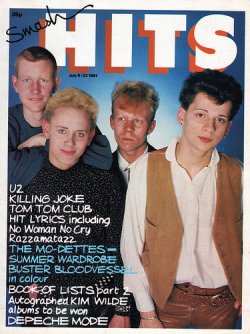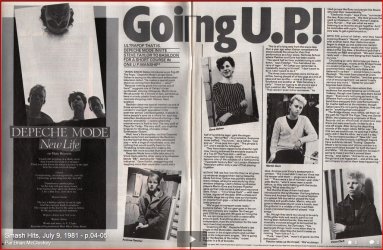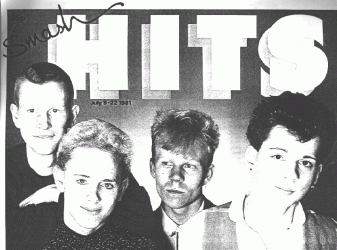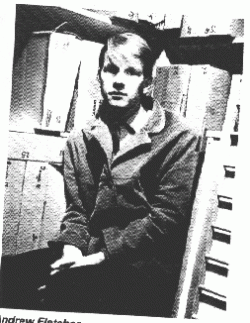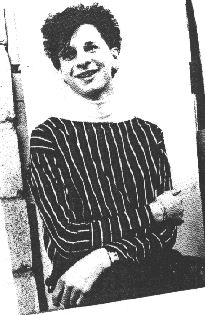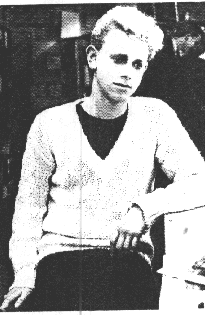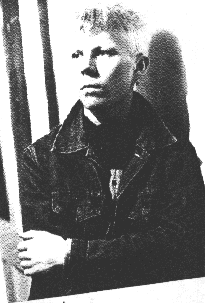Smash Hits 9.7.1981
'Going Up' by Steve Taylor. Pictures by Paul Slattery.
GOING U.P. !
ULTRAPOP THAT IS. DEPECHE MODE INVITE STEVE TAYLOR TO BASILDON FOR A SHORT COURSE IN ONE U.P.MANSHIP
"WHEN SIMON Bates introduces us on Top Of The Pops," Depeche Mode's singer Dave Gahan is saying on the afternoon before their television debut, "he makes a special point about us coming from Basildon--why?" "Because nothing good ever comes out of here?" suggests one of Gahan's three synthesiser playing colleagues, Martin Gore. We all ponder for a minute or two, perched up here in a tacky plastic-lined pub above the concrete shopping mall. Silence. Next question.
Basildon deserves special mention as one of those sprawling new-ish towns built to house London's 'overspill' population in the post-war period. Like Basingstoke, it stands in some people's eyes as a cliche for soul-less suburban development around a boring--the word is 'alienating'--centre where the entertainment is hard to find. The very stuff of Plays For Today. The very stuff, you might be forgiven for thinking, of classic Urban Synthesiser Gloom.
Well, here's the surprise; not that Depeche Mode come from somewhere like Basildon, but the fact that they play frothy adolescent pop--with a tinge of moodiness, sure, but nothing that would qualify them for the Throbbing Gristle award for making the listener feel more suicidal than ever before.
Depeche Mode have a little joke about it. Vince Clark calls the other camp of synthesiser bands "B&I", standing for "bleak and industrial." Dave Gahan, swaggering and laughing more than usual after a pint and a half of lunchtime lager, gets the slogan wrong: "We're P&U", he proclaims. Everyone looks baffled. "You know," says Gahan, "pop and up." Vince puts him right. "The phrase is U.P. and it stands for Ultrapop!".
They have every reason to be cheerful right now, having achieved the enviable exposure of a Top Of The Pops slot--with an independent label single, mind--and having become one of the subjects of a forthcoming "Twentieth Century Box" on London Weekend Television within only a year of first playing together.
WITHIN THE last few months they've all given up whatever stopped them being Depeche Mode full-time. Gahan was politely asked to leave college, where he was studying shop window dressing; Clark's fellow synthesiser players Martin Gore and Andrew Fletcher gave up their jobs as bank clerk and insurance clerk. Vince--"I'm a Vince Clark"--with least to lose, signed off the dole. With a cheap and portable stage set-up they now survive solely on income from gigs--a fact which they're justly proud of.
"We've got no transport costs really," explains Gahan, "all our gear goes in the car. We don't employ any roadies. So if we get paid 250 for a gig and 50 goes on hiring the PA, we can come out of it with a reasonable amount each. Everything about us is independent, even the promotion for the new record we hired ourselves.
"Dreaming Of Me", Depeche Mode's last single on the Mute label, reached number fifty-seven in the singles charts and number one in the independent singles. "We're going to be The Beatles of the indies," crows Fletcher in a fit of bravado.
This is all a long way from the scene less than a year ago when Gahan remembers he stood outside the venue for their first performance as a four-piece, Nicholas School where Fletcher and Gore had been pupils. "You spent half an hour outside trying to calm down," says Fletcher. "You had about ten cans of lager." All Gahan can remember is repeatedly saying to himself, "I don't want to do it, I don't want to do it."
The three instrumentalists were old hands at this, having played all of two gigs as a trio of bass and two synths--once at Scamps in Southend and another at "Deb Danahay's party". Vince isn't going to let anyone ask a fool question like "What were they like?" "They weren't even minor successes," he says. Andrew puts Vince's assessment in context: "The crowd didn't react so Vince lost his temper with them--plugs were kicked out." "There were a lot of fourteen-year-olds," adds Martin, "who'd never seen a synth before, so they were fiddling with the knobs going 'What does this do?'."
Not that the three of them had been introduced to the synthesiser that long before. Vince and Andrew had their musical baptism in a gospel folk duo which played the local churches and youth clubs; Martin, who still goes to Methodist church once a month, was the guitarist in a middle-of-the-road West Coast orientated band which played "nice songs."
So, though they were too young to be early 1970s glitter kids and readily admit to not having been diehard punks, they were all musically involved enough to be touched by crucial innovations. As Clark says, "You appreciate things much more when they're past." Gahan describes the band's tastes as running "from folk to P.I.L.". "Punk," says Clark, "wasn't all good, but the enthusiasm..."
Fletcher takes up the thread: "We've always liked groups like Roxy and people like Bowie who kept their respectability." "Electronic music," says Vince, "connected the two, Roxy and punk." We liked groups that used synthesisers--OMD, Human League, Gary Numan--that was what we were listening to at the time we got together. And," he concludes with a grin, "synthesisers are very easy to get a good sound on."
WITH THE arrival of Gahan, who they heard crooning Bowie's "Heroes" at a jam session with another band, their distinctive style began to shape up and audiences reacted accordingly. Gahan recalls their four-piece debut at the Top Alex, a Southend pub that's normally an R&B stronghold: "We went down really well--they were banging their heads to our pop."
Circulating an early demo tape got them a valuable few gigs, mostly at the Bridge House In London's Canning Town--"Terry, the promoter there, was the only bloke who bellieved in us then"--and at Crocs in nearby Rayleigh. "We must have played at Crocs fifteen times," says Fletcher. "and that gave us a lot of encouragement; we weren't really nervous any more." "Speak for yourself," bounces back Gahan.
Crocs was also the place where their audience first started dressing up in frills and makeup, though now Gahan says that's toned down: "Everyone's not trying so hard to be different from one another, it's smarter." The band have swopped their cute Romanticism for macho leathers at the moment, though Gahan says it's not a policy decision, they just go for "anything that looks good."
The Bridge House, meanwhile, set them on the path for Top Of The Pops. They met Daniel Miller, the unassuming proprietor of Mute Records and an afficionado of electronic pop there and were eventually invited to do a one-off single. After doing the dispiriting rounds of the major labels, Miller was "the flrst one we could trust; he said that if either party didn't like the other, we'd call it a day."
The imminent success of "New Life" and the fact that the formerly indifferent majors have suddenly started "finding" Depeche Mode's demo tape and 'phone number is a great confidence booster for both the band and Miller. "All the majors told him he wasn't going to make it and he's proved them wrong," says Gahan. "And as for us, so far things have just happened--and at this rate we're happy to just let them keep happening."
NEW LIFE
I stand still stepping on A shady STREET
And I watch that man to a stranger
Think you only know me when you turn on the light
Now the room is lit RED danger
chorus
Transition to another place
So the time will pass more slowly
Your features fuse and your shadow's red
Like a film I SEE, now show me
Chorus
MY face is hidden and we're out of sight
and the road just leads to nowhere
The stranger in the door is the same as before
So the question ANSWERS nowhere
...
